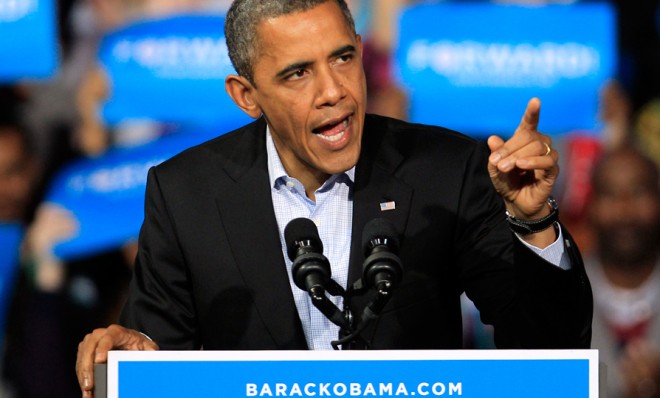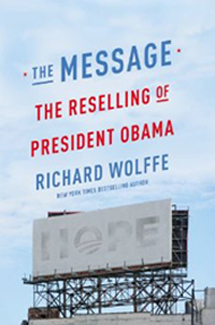Obama 2012: From hope and change to fear and loathing
Four takeaways from a new book detailing the behind-the-scenes drama of Obama’s re-election campaign

A free daily email with the biggest news stories of the day – and the best features from TheWeek.com
You are now subscribed
Your newsletter sign-up was successful
A lot can change in four years. Obama's original campaign for president in 2008, masterminded by campaign manager David Plouffe and chief strategist David Axelrod, was a triumph of messaging and internal organization. But we are now beginning to learn that Obama 2012 was a different kind of campaign — one, in the words of Richard Wolffe's new book The Message, where "personal tensions started earlier and rapidly worsened."

The president's team — including Plouffe, Axelrod, former White House press secretary Robert Gibbs, and new campaign manager Jim Messina — let themselves be consumed by "bitter, dogged rivalries" in 2012, writes Wolffe, in an excerpt of the book published in The Daily Beast. Here, four takeaways from the behind-the-scenes drama:
1. The "cold war" between Messina and Axelrod
The Week
Escape your echo chamber. Get the facts behind the news, plus analysis from multiple perspectives.

Sign up for The Week's Free Newsletters
From our morning news briefing to a weekly Good News Newsletter, get the best of The Week delivered directly to your inbox.
From our morning news briefing to a weekly Good News Newsletter, get the best of The Week delivered directly to your inbox.
Axelrod, once the favorite son of the president, had been pushed to the outer circle of his confidants by the time the 2012 election campaign began. The mustachioed strategist was forced out of the White House in January 2011, and would have only a limited role in the re-election campaign. Messina, on the other hand, was now within Obama's inner circle. Originally hired by Plouffe to run Obama's Chicago office in 2008, Messina was put in charge of the entire 2012 campaign.
Throughout 2011, he and Axelrod repeatedly butted heads over the direction of the campaign. "Axe" ran his messaging team separately, and did everything he could to undermine Messina's leadership. He would joke that Plouffe and Messina were akin to Russian President Vladimir Putin and his lackey prime minister Dmitri Medvedev. Messina fought back, but didn't have the authority to fire Axelrod. "Instead, they fought by proxy," writes Wolffe, "like cold war superpowers."
2. David Axelrod was all about the Benjamins
A key point of contention between Axelrod and Messina was money, according to Wolffe. Axelrod had capped his fees in 2008 in expectation of a tightly financed race, since no one expected Obama to raise the millions that he had. He wasn't going to make that mistake twice, and hired a lawyer to negotiate a more lavish salary. His job in the White House had meant he'd missed out on the high speaking fees commanded by the likes of Plouffe, and he felt he was owed his due.
A free daily email with the biggest news stories of the day – and the best features from TheWeek.com
But Messina was insistent "nobody was going to get rich from the re-elect," writes Wolffe — everybody was going to be treated fairly, and that included Axelrod. The contract negotiations got nasty, as Axelrod's lawyer wrangled on his behalf, and Messina claimed to have Obama's support in giving everyone similar, standardized salaries. "I don't want anybody to get rich over this," is how friends said he explained this thinking. "They're going to get rich on the books they write afterwards."
3. Robert Gibbs was paid $15,000 a month to do "nothing"
The president's former press secretary, however, had no such worries about money — he was already earning $1 million a year as a public speaker, and was much in demand from private companies, including Facebook. The campaign paid him $15,000 to make fundraising calls, and visit Chicago once a week, but Gibbs ended up traveling there fewer than 12 times over the entire campaign. He was also excluded both from senior strategy meetings and Air Force One. "We paid him to do absolutely nothing," one aide told Wolffe. "What he wanted was to hang out with Barack Obama, and there was no way he was going to be allowed on the plane. The plane was very disciplined and there was no room for him there."
4. No Drama Obama kept his hands clean
While Obama's campaign staff fell out with each other, the president himself stayed above the fray. "His political team was his blind spot," said Wolffe, and Obama didn't even acknowledge there were issues. Advisers suspected he probably knew what was going on, but ignored the problems in the hope they would either resolve themselves or go away. So long as communications and strategy weren't affected, he was fine. "The principal's position is 'You guys figure it out. Come to me with your recommendation,'" said one communications source. "Obama generally doesn't like to be in this position when it comes to political stuff."
Dan Stewart is a senior editor at The Week magazine. Originally from the U.K., he has been living in the United States since 2009.
-
 Quiz of The Week: 14 – 20 February
Quiz of The Week: 14 – 20 FebruaryQuiz Have you been paying attention to The Week’s news?
-
 The Week Unwrapped: Do the Freemasons have too much sway in the police force?
The Week Unwrapped: Do the Freemasons have too much sway in the police force?Podcast Plus, what does the growing popularity of prediction markets mean for the future? And why are UK film and TV workers struggling?
-
 Properties of the week: pretty thatched cottages
Properties of the week: pretty thatched cottagesThe Week Recommends Featuring homes in West Sussex, Dorset and Suffolk
-
 The billionaires’ wealth tax: a catastrophe for California?
The billionaires’ wealth tax: a catastrophe for California?Talking Point Peter Thiel and Larry Page preparing to change state residency
-
 Bari Weiss’ ‘60 Minutes’ scandal is about more than one report
Bari Weiss’ ‘60 Minutes’ scandal is about more than one reportIN THE SPOTLIGHT By blocking an approved segment on a controversial prison holding US deportees in El Salvador, the editor-in-chief of CBS News has become the main story
-
 Has Zohran Mamdani shown the Democrats how to win again?
Has Zohran Mamdani shown the Democrats how to win again?Today’s Big Question New York City mayoral election touted as victory for left-wing populists but moderate centrist wins elsewhere present more complex path for Democratic Party
-
 Millions turn out for anti-Trump ‘No Kings’ rallies
Millions turn out for anti-Trump ‘No Kings’ ralliesSpeed Read An estimated 7 million people participated, 2 million more than at the first ‘No Kings’ protest in June
-
 Ghislaine Maxwell: angling for a Trump pardon
Ghislaine Maxwell: angling for a Trump pardonTalking Point Convicted sex trafficker's testimony could shed new light on president's links to Jeffrey Epstein
-
 The last words and final moments of 40 presidents
The last words and final moments of 40 presidentsThe Explainer Some are eloquent quotes worthy of the holders of the highest office in the nation, and others... aren't
-
 The JFK files: the truth at last?
The JFK files: the truth at last?In The Spotlight More than 64,000 previously classified documents relating the 1963 assassination of John F. Kennedy have been released by the Trump administration
-
 'Seriously, not literally': how should the world take Donald Trump?
'Seriously, not literally': how should the world take Donald Trump?Today's big question White House rhetoric and reality look likely to become increasingly blurred